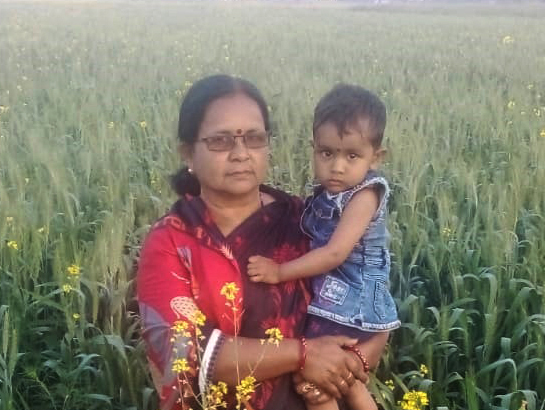Vidya Rani Singh, 53, hails from Khesrahiyan village, in the Bhojpur district of Bihar, India. She was only 15 years old when she got married. She had always been a very bright student and therefore wanted to continue her education even after her marriage. Rani continued to take her education seriously and passed her high school board exams at the age of 18, in 1986.
In 2003, Vidya realized the importance of becoming independent and felt the need to work. She decided that she could become financially independent through farming. Therefore, she sought her husband’s support and asked him to let her farm in their 1.2 hectares of unused barren land. Vidya started watering the land from her neighbor’s wells. Vidya was soon growing various crops such as wheat, lentils, potatoes, sugarcane, mustard, and rice.
By 2004, Vidya had enough savings to buy a tractor for her farm. Her first tractor was bought on monthly installments. The use of machinery on the farm was unheard of among her family and neighbors. Initially, her family resisted the change, but they gradually started supporting her decisions. As her farm turned out to be profitable, her dream to study resurfaced.
“Although my farms were doing well and we now had our water bore in the farms, my dream to complete my college education was still incomplete. It was my only dream. Therefore, at 40, I decided to continue my education and began studying for the Bachelor of Arts (BA). I appeared for my BA exam with my teenage daughter. Such a step was unheard of in my village, but I was determined! My dream came true when my daughter and I passed our exams successfully,” said Vidya with pride.
In the subsequent years, Vidya was able to purchase two more tractors to help her with farming activities. In 2020, she visited the Krishi Vigyan Kendra (KVK, one of India’s agricultural extension centres that are usually associated with a local agricultural university) in Bhojpur and learned about the new varieties of biofortified wheat in the Indian market.
HarvestPlus provided 400 kg seed to KVK Bhojpur, who in-turn provided farmers with 10 kg seed bags (for smaller farms) and 40 kg seed bags (for larger farms) of BHU-25 & BHU-31 for planting in 2020. Vidya was provided with 10 kg bags each of BHU25 & BHU-31.
The new biofortified wheat variety seemed promising to Vidya. Consequently, she planted the WB-25 and BHU-31 biofortified zinc wheat varieties on plots of 1.5 acres each. The following year she was able to harvest around 50 quintals (5000 kilograms (kg)) of biofortified wheat from each plot. Moreover, she was able to sell the biofortified produce at a more significant profit margin. Compared to INR 1500 (USD 20) per 100 kg for regular wheat varieties, Vidya now sells the new variety of biofortified wheat at INR 2110 (USD 29) per 100 kg.
“I was thrilled with the returns, and my family has been very supportive in whatever I do. I want more women to take up biofortified farming. I have even shared 15 kg of our homegrown zinc wheat seed with two other female farmers from my village. Both have planted the biofortified wheat on 0.5 acre of land. Through my efforts, the word is spreading, and more women are taking up biofortified-crop farming in our village,” explained Vidya.
Ever since adopting biofortified wheat varieties, Vidya saves up to ten quintals (1000 kg) of zinc wheat every year for consumption and harvesting purposes. The rest of the produce from her farm is sold in the market. Wheat straw, a by-product of grain, is used to feed the livestock (two cows) at her farm. The cultivation of biofortified zinc wheat not only brought Rani some extra cash but also increased her popularity in the village. Since 2019, Vidya has been a director at the Koilwar Farmer Producer Organization (FPO) in the Bhojpur district. FPOs act as an aggregator for member farmers for both inputs and products, which increases members’ economies of scale and bargaining power.
Today, 150 female farmers from her village are associated with the FPO. The organization allows these women to purchase seeds and fertilizers at a lower rate compared to the market, thereby facilitating more female farmers to grow their own food.
Vidya looks very happy with how the FPO is working. She is determined to encourage and support other female farmers in her village. She believes that active participation in the village’s farming activity will provide many women with a chance to experience financial independence. This financial independence can also motivate them to fulfill their dreams and aspirations.
Consumption of biofortified zinc wheat is a cost-effective and sustainable solution to combat zinc deficiency and prevent morbidity. Zinc wheat is currently grown by about 70,000 farmers in Bihar and 442,000 farming households across India, with an estimated 2.1 million household members benefiting.
